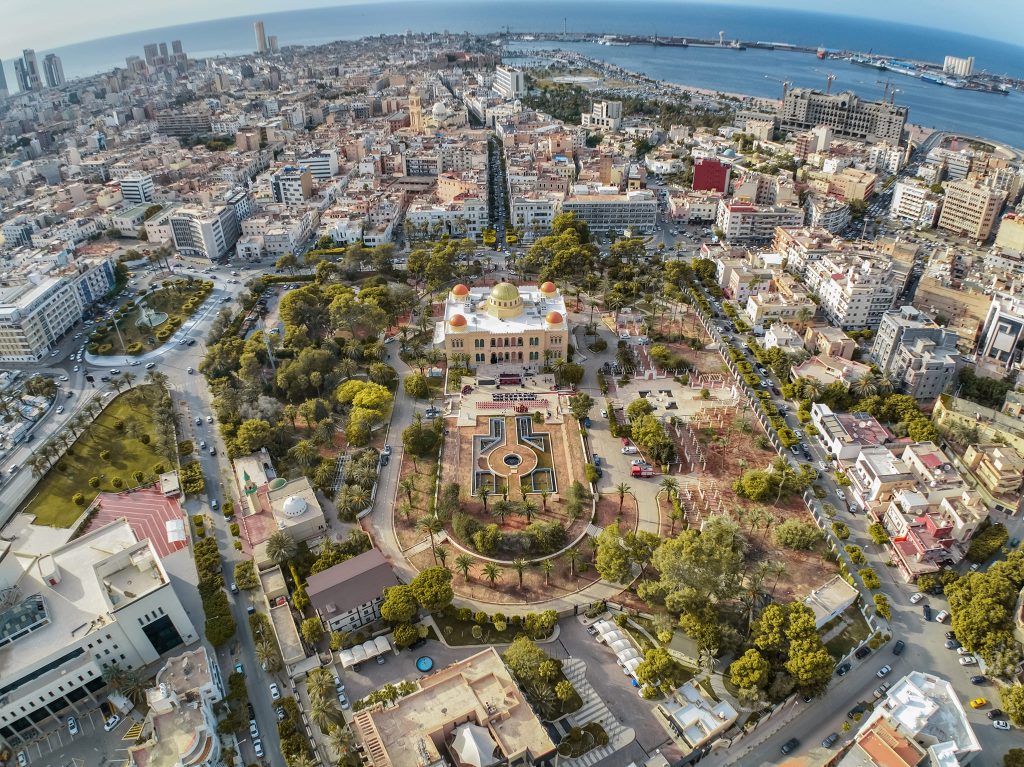In the complex landscape of Libya’s legal framework, arbitration has emerged as a vital mechanism for resolving disputes efficiently and effectively. As we navigate the intricacies of this evolving system, it’s clear that arbitration offers a strategic alternative to traditional litigation, fostering a more conducive environment for business and investment.
At Qabas, we pride ourselves on being Libya’s leading legal advisory and consulting firm, dedicated to setting industry benchmarks in arbitration practices. Our commitment to innovative solutions ensures that our clients receive tailored guidance that aligns with their unique needs, empowering them to navigate the challenges of the Libyan legal landscape with confidence. Through our expertise, we aim to enhance the understanding and application of arbitration, reinforcing its role as a cornerstone of commercial dispute resolution in Libya.
Table of Contents

Overview of Arbitration in Libya
Arbitration serves as a vital component of Libya’s legal landscape, offering an effective mechanism for resolving disputes efficiently. We possess a deep understanding of the Libyan legal frameworks, enabling us to navigate complex arbitration processes with precision. Our extensive expertise ensures that we deliver tailored solutions that meet the unique needs of our clients.
We recognise the common legal challenges faced in Libya, including lengthy court procedures, enforcement issues, and inconsistencies within existing laws. Our strategic approach addresses these challenges directly, providing clients with the support they need to achieve favourable outcomes. By prioritising integrity and transparency, we build lasting relationships based on trust and results.
Our commitment to enhancing the understanding of arbitration in Libya positions us as the definitive choice for legal services. We actively engage with stakeholders to promote best practices and advocate for the continued development of arbitration as a preferred dispute resolution method. Through our efforts, we aim to establish a robust framework that benefits both domestic and international parties operating within Libya.

Historical Context of Arbitration
Arbitration in Libya has evolved significantly over the decades, reflecting the country’s socio-political changes. Understanding the historical context provides valuable insights into its current framework.
Pre-Conflict Arbitration Framework
Before the armed conflict that began in 2011, Libya had a developing arbitration system influenced by various legal traditions. The Libyan Civil Code, adopted in 1953, contained provisions addressing arbitration, aiming to integrate it into the judicial process. We recognise that this framework lacked consistency, with limited practical implementation due to political instability. Arbitration was predominantly utilised in commercial disputes, but its effectiveness varied, often hampered by bureaucratic inefficiencies. Our expertise allows us to navigate these complexities, enabling clients to apply arbitration effectively in their legal strategies.
Post-Conflict Developments in Arbitration
Following the conflict, Libya saw efforts to rebuild its legal infrastructure, including arbitration. New regulations and laws emerged, promoting arbitration as a preferred mechanism for resolving disputes efficiently. We leverage our deep understanding of these evolving Libyan legal frameworks to provide tailored solutions for our clients, ensuring compliance with contemporary standards. Recent developments underline a growing recognition of arbitration’s importance, fostering a framework that enhances both domestic and international arbitration practices. Our commitment to precision and integrity positions us as a trusted partner in navigating the post-conflict legal landscape, addressing common challenges like enforcement and procedural delays effectively.

Legal Framework Governing Arbitration
Arbitration in Libya operates within a robust legal framework that facilitates effective dispute resolution. Our expertise at Qabas enables us to navigate these complexities, ensuring our clients receive the highest standard of legal service.
National Legislation
Libya’s national legislation governing arbitration is primarily encapsulated in the Libyan Civil Code, which lays the groundwork for arbitration agreements, proceedings, and enforceability. We ensure that our clients understand the nuances of these laws, helping them draft clear and enforceable arbitration clauses that align with the current legal standards. Our strategic approach allows us to address common challenges, such as lengthy court processes and enforcement difficulties, through meticulous planning and execution tailored to each client’s specific needs.
International Conventions and Treaties
Libya is a signatory to various international conventions that pertain to arbitration, including the New York Convention on the Recognition and Enforcement of Foreign Arbitral Awards. Our deep understanding of these conventions allows us to guide clients in navigating the international arbitration landscape effectively. We leverage these treaties to enhance the enforceability of arbitration awards in Libya, ensuring our clients can resolve disputes efficiently. Our commitment to delivering precise and effective solutions establishes Qabas as a definitive choice for arbitration-related legal services in Libya.
Types of Arbitration Practices in Libya
Arbitration practices in Libya encompass various forms designed to cater to the unique needs of the country’s legal landscape. Our expertise at Qabas enhances these practices, ensuring effective dispute resolution tailored to specific scenarios.
Commercial Arbitration
Commercial arbitration serves as a paramount method for resolving disputes between businesses operating within Libya. We understand the intricacies of commercial laws and regulations, which allows us to draft clear and enforceable arbitration agreements. Clients appreciate our strategic approach, which emphasises adherence to the Libyan Civil Code and recognition of international conventions. We’re committed to fostering a transparent process that mitigates the risks associated with lengthy litigation.
Dispute Resolution in the Oil Sector
Dispute resolution in the oil sector presents unique challenges given the industry’s complexity and regulations. We leverage our deep understanding of Libyan legal frameworks to provide tailored solutions for clients involved in this critical sector. Our team addresses common legal hurdles, such as enforcement issues and contractual disputes, with precision and integrity. By prioritising clear communication and thorough preparation, we ensure that all parties involved navigate the arbitration process effectively and achieve favourable outcomes.

Challenges Facing Arbitration in Libya
Arbitration in Libya encounters several obstacles that affect its effectiveness as a dispute resolution mechanism. We focus on the key challenges contributing to this landscape.
Institutional Limitations
Institutional limitations hinder the efficiency of arbitration in Libya. We recognise that inadequate infrastructure and a lack of established arbitration institutions create barriers for parties seeking resolution. Limited access to trained arbitrators and insufficient institutional support impede the development of robust arbitration practices. Our deep understanding of these limitations allows us to navigate these intricacies effectively, ensuring our clients benefit from well-structured arbitration procedures.
Political and Economic Factors
Political and economic factors significantly impact arbitration in Libya. Ongoing instability and fluctuating economic conditions generate uncertainty, affecting investor confidence. The volatile political landscape often complicates the enforcement of arbitration awards, as local courts may exhibit reluctance to uphold decisions seen as politically sensitive. We leverage our expertise to address these challenges, guiding clients through complex negotiations while ensuring compliance with relevant Libyan legal frameworks. Our commitment to delivering results with precision and integrity positions us as the definitive choice for navigating arbitration in this evolving environment.
Conclusion
Arbitration in Libya stands as a crucial mechanism for resolving disputes efficiently and effectively. As we navigate the complexities of the legal landscape our focus remains on enhancing the understanding and application of arbitration practices. By prioritising integrity and transparency we build lasting relationships with our clients, ensuring they receive tailored solutions that meet their needs.
With ongoing efforts to strengthen the legal framework and address existing challenges we’re committed to promoting best practices in arbitration. Our deep understanding of Libyan laws and international conventions positions us as a trusted partner for both domestic and international entities. Together we can foster a robust arbitration environment that benefits all stakeholders involved in Libya’s evolving commercial landscape.
Frequently Asked Questions
What is the significance of arbitration in Libya’s legal framework?
Arbitration in Libya serves as an efficient method for dispute resolution, offering a preferable alternative to traditional litigation. It addresses issues like lengthy court procedures and helps both domestic and international parties navigate the complexities of the legal landscape effectively.
How does Qabas support clients in arbitration?
Qabas provides innovative and tailored solutions to help clients understand and apply arbitration effectively. Their expertise ensures compliance with legal frameworks, facilitates the drafting of enforceable arbitration clauses, and offers guidance through the arbitration process.
What are the key features of Libya’s arbitration legal framework?
Libya’s arbitration legal framework, primarily outlined in the Libyan Civil Code, establishes guidelines for arbitration agreements, proceedings, and enforceability. The country also honours international conventions, such as the New York Convention, which enhances the enforceability of arbitration awards.
What challenges does arbitration face in Libya?
Arbitration in Libya encounters several challenges, including inadequate infrastructure, political instability, and fluctuating economic conditions. These factors can hinder efficiency and investor confidence, making enforcement of arbitration awards particularly complicated.
How does Qabas address challenges in arbitration?
Qabas utilises its extensive knowledge of Libyan legal frameworks to navigate the complexities and challenges of arbitration. They guide clients through difficult negotiations and ensure compliance with relevant laws, providing reassurance in a challenging legal environment.
What types of arbitration practices are prevalent in Libya?
Commercial arbitration is a key practice in Libya, especially for resolving disputes between businesses. Qabas’ expertise in commercial law allows them to draft enforceable agreements and facilitate transparent processes that mitigate the risks associated with protracted litigation.
How has the historical context influenced arbitration in Libya?
The historical context has shaped Libya’s arbitration system, especially after the 2011 conflict. Efforts to rebuild the legal infrastructure have introduced new regulations that promote arbitration, moving it from a developing system to a preferred dispute resolution mechanism.
Why is Qabas an ideal partner for arbitration services in Libya?
Qabas is well-positioned as a leading legal advisory firm in Libya due to its commitment to integrity, transparency, and best practices in arbitration. Their deep understanding of local laws ensures clients can resolve disputes efficiently while navigating the evolving legal landscape.



